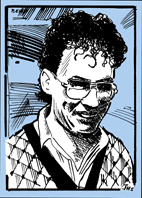| crime.files |
| |
 |
|

| crime.features |
| |
 |
|

| crime.resources |
| |
 |
|

| crime.co.nz |
| |
 |
|


|
 |  |

Peter Ellis
Former day-care worker, Peter Ellis was released in Feburary 2000 after serving two-thirds of his sentence,after being found guilty of 16 charges of sexual abuse against children in his care.
The case has always been controversial, dividing New Zealand, and particularly Christchurch, into two camps, one believing he is innocent, the other convinced of his guilt. The issue which has festered since his arrest in 1992, surfaced again dramatically on Sunday 16 November 1997, with a 20/20 television programme which painted a picture of a highly questionable approach by the State and of jury irregularities. The previous day, the media reported that the Solicitor General has ordered an inquiry into the Ellis jury.
The Peter Ellis prosecution: where’s the truth?
Controversial case resurfaces
The Solicitor General’s interest centres on claims that two jury members did not declare their interests before, or after being appointed. The first concern is that the jury foreman is said to have been the marriage celebrant at Crown Prosecutor Brent Stanaway’s wedding 15 years earlier. The second was that another juror had been involved in a lesbian relationship with the mother of one of the alleged victims
TV3’s journalist Melanie Reid claimed on the 20/20 programme, that former detective Colin Eade, a primary crèche sexual abuse allegations investigator, had a history of psychiatric problems and an obsessive personality. (Eade has since disengaged from the police suffering from post traumatic stress disorder. He said on the 20/20 programme he was ‘burnt out’ before the case started and ‘beyond repair’ by the time it was finished).
On 19 November police commissioner Peter Doone told a Parliamentary Select Committee on Expenditure, that he would have the allegations against Colin Eade investigated and would report back to the committee. He said this could take months, based on the experience of the length of time it was taking to investigate Joe Karam’s criticisms of the police handling of the Bain murders investigation. Mr Doone also told the Select Committee he regarded the allegations made against Mr Eade as ‘extremely serious’. He is reported in the Dominion of 20-11-97 as saying “I can assure you that if there are any ethical, procedural or fairness breaches on the part of the police ... I will take every step to ensure that justice will be done”.
Ellis’s supporters are reported as saying a police review woul
 |
 |
 |
 |
| The case has always been controversial, dividing New Zealand, and particularly Christchurch, into two camps, one believing he is innocent, the other convinced of his guilt. |
 |
 |
d be too narrow and that only a ‘full inquiry’ would suffice. They want an inquiry to also look at the role of the Christchurch City Council, the Ministry of Social Welfare, police investigators other than former detective and the Crown prosecutor.
In an interview with Sean Plunkett on Radio New Zealand’s Morning Report on 20 November, Colin Eade was questioned about allegations he’d had relationships with two of the creche children’s’ mothers and had attempted to have a relationship with a third. Eade told Plunkett he had come home after drinking heavily and received a phone call from an alleged victim’s mother. Eade admitted he had ‘stupidly propositioned her’. He said he had realised his foolishness the next day and tried to pass it off on the basis he had only been joking, but he admitted to Plunkett he had seriously put the proposition. He went on to say the relationships with the other two women had occurred well after the trial.
Phil Goff, Labour’s spokesperson on law and order and Greg O’Connor, President of the New Zealand Police Association (the police union) debated the case on Morning Report the same day. Phil Goff said he had always been uneasy about the convictions. His primary concern appeared to be that the more bizarre claims made by some children had not been put before the court by the Crown prosecutor because of their potential to damage the credibility of the alleged victims.
Greg O’Connor questioned the objectivity of the 20/20 programme and said it was wrong to resurrect the Ellis case on the basis of such a one-sided programme. His position was, that the matter had been properly dealt with in the High Court and Court of Appeal and that none of the information now being raised was new.
|
 |
|

Convicted of crimes against children. The Peter Ellis case is full of controversy. Has he been persecuted? |

 |
 |

 |
 |
|